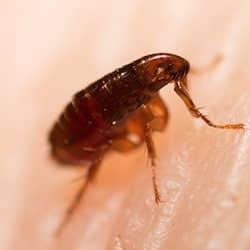Effective flea and tick control starts with understanding. The more you know about these tiny biting parasites, the better you will be able to prevent them around your Amherst property. Today we will be breaking down the habits, dangers, and diets of fleas and ticks and shining a light on some simple tricks that work great to prevent these pests from entering into your home. Here is everything you need to know.
What Are Fleas And Ticks?
Fleas and ticks are very different animals. Although both feed on blood, their appearance, habits, and invasion strategies vary drastically. To help break things down for you today, here is what you need to know about each.
Fleas are tiny parasitic pests that rely mainly on the blood of animals to survive. To get onto a host, fleas jump using their powerful legs. Once aboard, fleas will feed at their leisure, lay eggs, and do their best to avoid danger. If scratched or shaken off, fleas are capable of living without a blood meal for upwards of two weeks while they seek a new host.
Ticks are small parasitic pests that rely on the blood of mammals to survive. Due to their lack of speed, jumping ability, and wings, ticks have to get creative to get onto their hosts. Most often, these pests will climb to the top of tall grass, reach out their front legs, and wait for a person or animal to walk by so that they can latch on. Once aboard a human or animal, ticks will feed and then drop back off. After feeding, a tick is capable of living for upwards of 584 days without a blood meal.
Both fleas and ticks invade the homes of their chosen hosts. Fleas are more likely to get inside on pets, rodent invaders, or wildlife, while ticks are more likely to get in latched onto humans.
Problems Fleas And Ticks Cause
Although different, fleas and ticks share many problems. To start, fleas and ticks both spread dangerous diseases and parasitic worms. Fleas carry and spread diseases such as the bubonic plague, murine typhus, and tularemia. At the same time, ticks are mostly known for transmitting Lyme disease, Rocky Mountain spotted fever, anaplasmosis, babesiosis, and ehrlichiosis.
Constant feeding from either fleas or ticks may also lead to anemia, a sickness related to low iron levels within the body. Allergic reactions are also commonly associated with flea saliva. If you notice rashes or irritation on your skin and know fleas are around, chances are you are allergic.
Finally, both fleas and ticks are extremely difficult to eliminate. Able to avoid danger with ease, and known for infesting deep into the framework of homes, you will be hard-pressed to remove these pests from your home with anything other than professional pest control services.
5 Ways To Prevent Fleas And Ticks
Although nearly impossible to treat on your own, fleas and ticks are preventable. Here are five tips we recommend putting in place around your Amherst property.
- Keep your grass cut short and your bushes well maintained.
- Clean clutter and debris from your yard.
- Avoid walking through tall grass or dense foliage.
- Seal the exterior of your home so that both fleas, ticks, and the creatures they invade can't get inside.
- Invest in high-quality flea and tick control for your pets.
How To Deal With A Flea or Tick Infestation
If fleas or ticks have invaded your Amherst home, turn to the professionals at American Pest Solutions. You will be hard-pressed to find a more affordable and effective answer for pest problems.
Reach out to us today with any questions or to schedule a service visit for your home.

